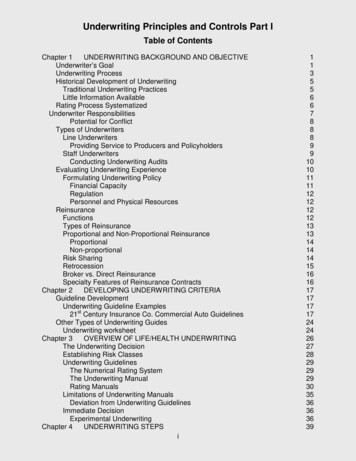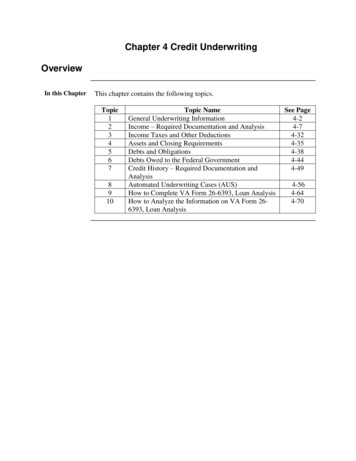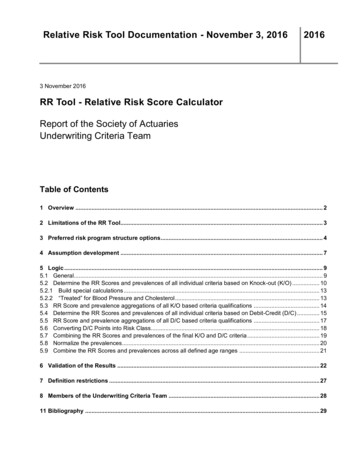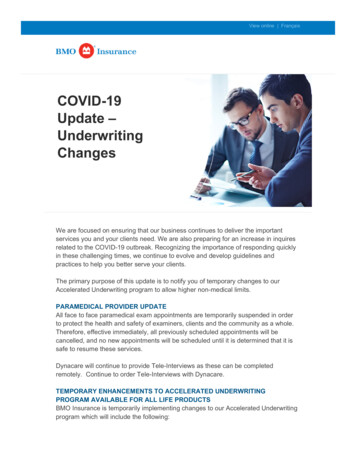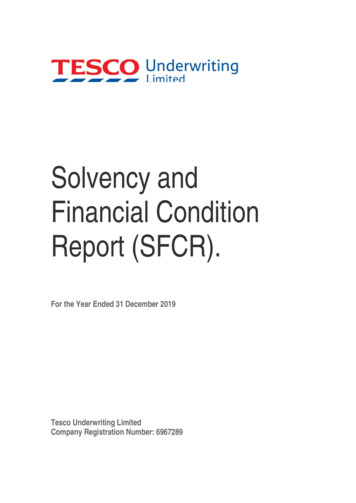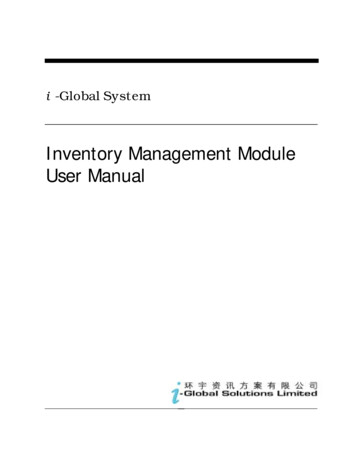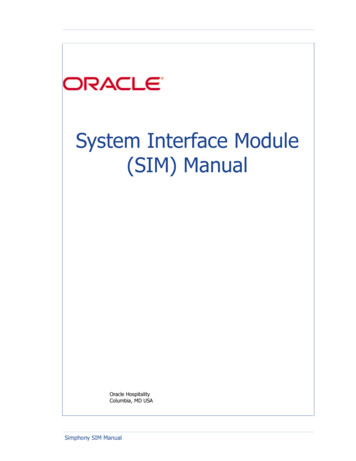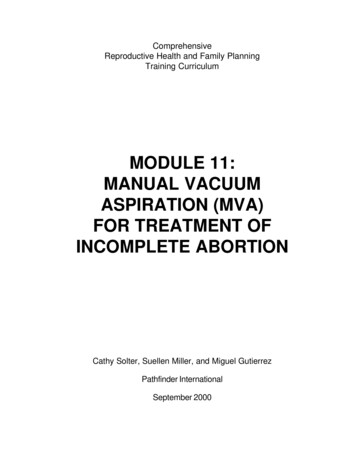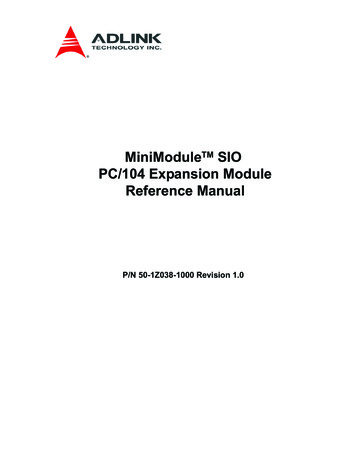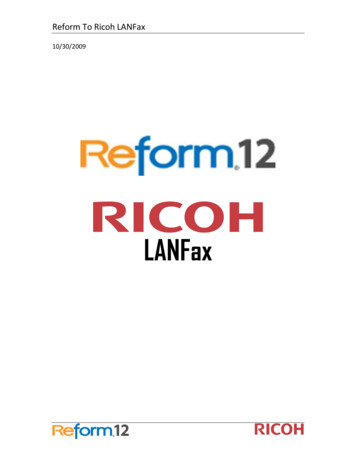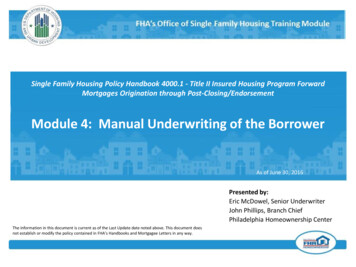
Transcription
Single Family Housing Policy Handbook 4000.1 - Title II Insured Housing Program ForwardMortgages Origination through Post-Closing/EndorsementModule 4: Manual Underwriting of the BorrowerAs of June 30, 2016Presented by:Eric McDowel, Senior UnderwriterJohn Phillips, Branch ChiefPhiladelphia Homeownership CenterThe information in this document is current as of the Last Update date noted above. This document doesnot establish or modify the policy contained in FHA’s Handbooks and Mortgagee Letters in any way.
FHA’s Office of Single Family Housing Training Module2
FHA’s Office of Single Family Housing Training ModuleIntroductionThe Manual Underwriting of the Borrower section of theHandbook provides Mortgagees FHA’s policy requirements todetermine a borrower’s ability to obtain FHA insured singlefamily financing considering:– Creditworthiness;– Effective income; and– r3
FHA’s Office of Single Family Housing Training ModuleManual Underwriting of the Borrower4
FHA’s Office of Single Family Housing Training ModuleManual Underwriting RequirementsThe Mortgagee must manually underwrite those applicationswhere: TOTAL issues a Refer; The application was downgraded to a manual underwrite; or FHA programs requires manual underwriting for theapplication.5
FHA’s Office of Single Family Housing Training ModuleAccept Risk Classifications Requiring a Downgrade toManual UnderwritingA mortgage that received an Accept recommendation must bedowngraded if: The mortgage file contains information or documentation thatcannot be entered into, or evaluated by TOTAL MortgageScorecard; Additional information, not considered in the AUSrecommendation, affects the overall insurability of theMortgage;6
FHA’s Office of Single Family Housing Training ModuleAccept Risk Classifications Requiring a Downgrade toManual Underwriting (cont.) The Borrower has 1,000 or more collectively in DisputedDerogatory Credit Accounts; The case number assignment date is within three years of anyof the following events:– The date of the transfer of title through a Pre-Foreclosure Sale(Short Sale);– The date of the transfer of title through a foreclosure sale;– The date of the transfer of title through a Deed-in-Lieu (DIL) offoreclosure;7
FHA’s Office of Single Family Housing Training ModuleAccept Risk Classifications Requiring a Downgrade toManual Underwriting (cont.) The date of the Borrower’s bankruptcy discharge as reflectedon bankruptcy documents is within two years from the date ofcase number assignment; The Mortgage Payment history requires a downgrade asdefined in Housing Obligations/Mortgage Payment History; The Borrower has undisclosed mortgage debt; or Business income shows a greater than 20 percent decline overthe analysis period.8
FHA’s Office of Single Family Housing Training ModuleGeneral Credit Requirements9
FHA’s Office of Single Family Housing Training ModuleGeneral Credit Requirements Mortgagees must analyze the following to determine theBorrower’s creditworthiness:– Credit history;– Liabilities; and– Debts.10
FHA’s Office of Single Family Housing Training ModuleGeneral Credit Requirements (cont.) For each Borrower who will be obligated on the mortgageNote, the Mortgagee must either obtain a:– Tri-Merged Credit Report (TRMCR); or– Residential Mortgage Credit Report (RMCR) from anindependent consumer reporting agency. The Mortgagee may obtain a joint report for individuals withjoint accounts.11
FHA’s Office of Single Family Housing Training ModuleNon-Borrowing Spouse Community PropertyState: Consent and AuthorizationThe Mortgagee must obtain a non-borrowing spouse’s consentand authorization where necessary to: Verify specific information required to process the mortgageapplication, including the consent to verify their SSN with theSocial Security Administration (SSA).12
FHA’s Office of Single Family Housing Training ModuleCredit Report: Non-borrowing Spouse The Mortgagee must obtain a credit report for a nonborrowing spouse who resides in a community property state,or if the subject property is located in a community propertystate. The credit report must indicate the non-borrowing spouse’sSSN was matched with the SSA, or the Mortgagee mustprovide separate documentation indicating that the SSN wasmatched with the SSA.13
FHA’s Office of Single Family Housing Training ModuleCredit Report: Non-borrowing Spouse (cont.) Where a SSN does not exist for a non-borrowing spouse, thecredit report must contain, at a minimum, the non-borrowingspouse’s full name, date of birth, and previous addresses forthe last two years. As a reminder, the Mortgagee does not submit the nonborrowing spouse credit report as part of the TOTAL Scorecardrisk evaluation.14
FHA’s Office of Single Family Housing Training ModuleCredit Requirements:Types of Credit History15
FHA’s Office of Single Family Housing Training ModuleTypes of Credit HistoryTraditional Credit History Tri Merge Credit Report (TRMCR ) orResidential Mortgage Credit Report(RMCR). Includes all credit repository creditdata for an individual Borrower. A joint merged credit report willinclude all credit data on twoindividual Borrowers. Reporting format may differ amongcredit repository agencies but theygenerally eliminate duplicate recordswhen merging a joint credit report.Non-Traditional and Insufficient Credit Used for borrowers without a creditscore. Mortgagees can obtain a nontraditional credit report orindependently build a credit historyusing credit references. Credit references may vary and thereare preferred and alternative sources. Verification types may also vary.16
FHA’s Office of Single Family Housing Training ModuleTraditional Credit History: FHA’s Policy forTri-Merged or Residential Credit Reports If a traditional credit report is available, the Mortgagee mustuse a traditional credit report. If the Borrower supports a credit score from either a TriMerged or a Residential Credit Report, the Borrower must beevaluated based on traditional credit policies.17
FHA’s Office of Single Family Housing Training ModuleTraditional Credit History: FHA’s Policy forTri-Merged or Residential Credit Reports The Mortgagee must utilize, and include in the case binder,the same credit report and credit scores that were used forTOTAL Scorecard evaluation. If a traditional credit report is not available, or the borrowerhas insufficient credit, the Mortgagee must develop theBorrower’s credit history using the requirements for NonTraditional and Insufficient Credit.18
FHA’s Office of Single Family Housing Training ModuleNon-Traditional and Insufficient Credit Borrowers without a credit score, the Mortgagee must eitherobtain a:– Non-Traditional Mortgage Credit Report (NTMCR); or– Independently develop the Borrower’s credit history.19
FHA’s Office of Single Family Housing Training ModuleNon-Traditional Mortgage Credit Report (NTMCR)An NTMCR is designed to access the credit history of a Borrowerwho does not have the types of trade references that appear ona traditional credit report and used either as:– A substitute for a TRMCR or an RMCR; or– A supplement to a traditional credit report that has aninsufficient number of trade items reported to generate a creditscore.20
FHA’s Office of Single Family Housing Training ModuleNTMCR: Standard Mortgagees may use a NTMCR developed by a creditreporting agency that verifies the following information for allnon-traditional credit references:– The existence of the credit providers;– That the credit was actually extended to the Borrower; and– The creditor has a published address or telephone number. The NTMCR must not include subjective statements such as“satisfactory” or “acceptable,” and must be formatted in asimilar fashion to traditional references.21
FHA’s Office of Single Family Housing Training ModuleIndependent Verification of Non-TraditionalCredit Providers Mortgagees may independently verify the borrower’s nontraditional credit references. To conduct this verification, Mortgagees must document:– The existence of the credit provider; and– That the provider actually extended the credit to the Borrower.22
FHA’s Office of Single Family Housing Training ModuleNon-Traditional Credit Providers: VerificationsExistence of CreditProviderCredit InformationRental PaymentReview public recordsfrom the state, county, orcity or other documentsproviding a similar levelof objective information.Published address ortelephone number for thecredit provider (do not relysolely on informationprovided by the applicant)ANDMost recent 12 months ofcancelled checks, orequivalent proof ofpayment, demonstrating thetiming of payment to thecredit provider.Obtain a rental referencefrom the appropriaterental managementcompany (not from aFamily Member),demonstrating the timingof payment of the mostrecent 12 months in lieuof 12 months of cancelledchecks or equivalentproof of payment.23
FHA’s Office of Single Family Housing Training ModuleSufficiency of Credit References To be sufficient to establish the Borrower’s credit, the credit historymust include three credit references, including at least one ormore from the list below:– Rental housing payments;– Telephone service (cellphone is acceptable); and– Utilities (not included in rent): Gas;Electric;Water;Television service; andInternet.24
FHA’s Office of Single Family Housing Training ModuleSufficiency of Credit References (cont.)Two credit references can be used from the list provided below: Insurance premiums not payroll deductedPayment to child care providers (business)School tuitionRetail store credit cardsRent-to-ownPatient obligation for medical billsDocumented 12-month history of savings evidenced by regular deposits,not through payroll deductions, resulting in an increased balance to theaccount and that were made at least quarterly and did not causeinsufficient funds (NSF) checks. Automobile lease Personal loan from an individual with repayment terms in writing andpayments made supported by cancelled checks25
FHA’s Office of Single Family Housing Training ModuleSufficiency of Credit References: AuthorizedUser Accounts The Mortgagee may use Borrower Authorized User Accountsas a credit reference. The Mortgagee must obtain documentation to evidence thatthe Borrower:– Has been making regular on-time payments during the previous12 months;– Does not have a history of delinquent payments on the loan;and– The debt payment is be included in a Borrower’s DTI ratio.26
FHA’s Office of Single Family Housing Training ModuleCredit Requirements:Evaluating Credit History27
FHA’s Office of Single Family Housing Training ModuleGeneral The credit evaluation of the Borrower is comprised of two distinctbut related components:– An evaluation of the credit history; and– An evaluation of the liabilities and debts. When conducting a credit history evaluation, the underwriter mustexamine the Borrower’s overall pattern of credit behavior, not justisolated unsatisfactory or slow payments, to determine theBorrower’s creditworthiness. The Mortgagee must not consider the credit history of a nonborrowing spouse.28
FHA’s Office of Single Family Housing Training ModuleHierarchy of Payment History EvaluationThe underwriter must evaluate the Borrower's payment historiesin the following order:1) Previous housing expenses and related expenses,including utilities;2) Installment debts; and3) Revolving accounts.29
FHA’s Office of Single Family Housing Training ModuleSatisfactory Credit The underwriter may consider a Borrower to have anacceptable payment history:Housing and InstallmentRevolving12 Months24 Months0 x 302 x 302 x 60, 0 x 90---30
FHA’s Office of Single Family Housing Training ModuleCase Study: Credit History12 Months24 MonthsMortgage0 x 300 x 30Charge card2 x 301 x 60Home Equity0 x 301 x 30Car Loan1 x 301 x 30Charge Card1 x 600 x 30Charge Card0 x 301 x 3031
FHA’s Office of Single Family Housing Training ModuleCase Study: Credit History12 Months24 MonthsMortgage0 x 300 x 30Charge card2 x 301 x 60Home Equity0 x 301 x 30Car Loan1 x 301 x 30Charge Card1 x 600 x 30Charge Card0 x 301 x 3032
FHA’s Office of Single Family Housing Training ModuleSatisfactory CreditThe underwriter may consider a Borrower to have an acceptablepayment history:Housing and InstallmentRevolving12 Months24 Months0 x 302 x 302 x 60, 0 x 90---33
FHA’s Office of Single Family Housing Training ModulePayment History Requiring Additional Analysis The Mortgagee must analyze the Borrower’s delinquentaccounts to determine whether late payments were based ona disregard for financial obligations; an inability to managedebt; or extenuating circumstances. The Mortgagee must document this analysis in the mortgagefile. Any explanation or documentation of delinquent accountsmust be consistent with other information in the file.34
FHA’s Office of Single Family Housing Training ModulePayment History on Housing Obligations The Mortgagee must verify and document the previous 12months’ housing obligation payment history through:– The credit report;– Verification of rent received directly from the landlord (forlandlords with no Identity of Interest with the Borrower);– Verification of Mortgage payments received directly from themortgage servicer; or– A review of canceled checks that cover the most recent 12month period.35
FHA’s Office of Single Family Housing Training ModulePayment History on Housing Obligations (cont.) Borrowers who are living rent-free must provide a letter fromthe property owner where they are residing confirming thatthe Borrower has been living rent-free and for how long. A mortgage that has been modified must utilize the paymenthistory in accordance with the modification agreement for thetime period of modification in determining late housingpayments. Mortgages in which modifications incorporated deficiencybalances, are not considered delinquent.36
FHA’s Office of Single Family Housing Training ModuleExtenuating Circumstances: Clarification A list of acceptable Extenuating Circumstances is not provided inthe Single Family Housing Policy Handbook 4000.1. The underwriter must make the determination if the cause of thecredit history was due to a life changing event that was beyond theBorrower’s control and most likely will not reoccur. An example of a life changing event is:– Death or serious illness of a wage earner who contributes to the supportof the household. Divorce is not to be considered as an extenuating circumstance.37
FHA’s Office of Single Family Housing Training ModuleExtenuating Circumstances: Clarification (cont.) Mortgagees must obtain an explanation of the extenuatingcircumstances and document that they were beyond theBorrower’s control.– A written explanation in itself does not meet the creditworthinessrequirement.– Written explanation and supporting documentation must be consistentwith the derogatory credit on the credit report (e.g. type, dates). Underwriter must provide, as part of the final underwritingdecision, an analysis explaining the rationale for making thecredit exception.38
FHA’s Office of Single Family Housing Training ModuleCase Study: Mortgage History for Modification Mr. Smith has applied for a Cash-Out Refinance transaction. Hepurchased his home in 1999. Five months ago, Mr. Smith modified his mortgage and has paid asagreed per his modification agreement. His modificationagreement included a deficiency balance. Due to a divorce, Mr. Smith fell behind on making his mortgagepayments. Up until Mr. Smith’s modification agreement, Mr. Smithwas 90 days delinquent on his mortgage. What is the mortgage payment history for a Cash-Out Refinance? What mortgage payment history are we to consider for Mr. Smith?39
FHA’s Office of Single Family Housing Training ModuleCase Study: Mortgage History for Modification (cont.)What is the mortgage payment history we are to consider for a Cash-OutRefinance? Handbook 4000.1, Section II.A.8.Programs and Products - Refinancesv. Cash-Out Refinances(A) Borrower Eligibility(2) Payment History Requirements(a) Standard The Mortgagee must document that the Borrower has made all payments for alltheir mortgages within the month due for the previous 12 months or since theBorrower obtained the mortgages, whichever is less.Additionally, the payments for all mortgages secured by the subject propertymust have been paid within the month due for the month prior to mortgageDisbursement.Properties with mortgages must have a minimum of six months of MortgagePayments. Properties owned free and clear may be refinanced as cash-outtransactions.40
FHA’s Office of Single Family Housing Training ModuleCase Study: Mortgage History for Modification (cont.) What is Mr. Smith’s mortgage payment history? Program type for which Mr. Smith has applied requires areview for the previous 12 months or since the Borrowerobtained the mortgages, whichever is less. Mr. Smith:– 5 months 0 x 30 Since the modification– 7 months 7 x 90 Up until Mr. Smith’s modification agreement,Mr. Smith was 90 days delinquent41
FHA’s Office of Single Family Housing Training ModuleCase Study: Mortgage History for Modification (cont.) Is Mr. Smith’s mortgage payment history acceptable for aCash-Out Refinance?No.42
FHA’s Office of Single Family Housing Training ModuleJudgments Judgment refers to any debt or monetary liability of theBorrower, and the Borrower’s spouse in a communityproperty state unless excluded by state law, created by acourt, or other adjudicating body. The Mortgagee must verify that court-ordered Judgments areresolved or paid off prior to or at closing. Judgments of a non-borrowing spouse in a communityproperty state must be resolved or paid in full, with theexception of obligations excluded by state law.43
FHA’s Office of Single Family Housing Training ModuleJudgments: Exception Policy Clarification A Judgment is considered resolved if the Borrower has:– Entered into a valid agreement with the creditor to makeregular payments on the debt;– Has made timely payments for at least three months ofscheduled payments; and– The Judgment will not supersede the FHA-insured mortgagelien. The Borrower cannot prepay scheduled payments in order tomeet the required minimum of three months of payments.Note: All judgment liens must be subordinated.44
FHA’s Office of Single Family Housing Training ModuleJudgments: Required DocumentationThe Mortgagee must provide the following documentation:– Evidence of payment in full, if paid prior to settlement;– The payoff statement, if paid at settlement; or– The payment arrangement with creditor, if not paid prior to orat settlement; and a subordination agreement for any liensexisting on title.In addition, regardless of the amount of outstanding Judgments,the Mortgagee must determine if the Judgment was a result of:– The Borrower’s disregard for financial obligations;– The Borrower’s inability to manage debt; or– Extenuating circumstances.45
FHA’s Office of Single Family Housing Training ModuleChapter 7 Bankruptcy: Standard A Chapter 7 bankruptcy (liquidation) does not disqualify aBorrower from obtaining an FHA-insured mortgage if at thetime of case number assignment:– At least two years have elapsed since the date of the bankruptcydischarge; and– The borrower has re-established good credit or has chosen notto incur new credit obligations.46
FHA’s Office of Single Family Housing Training ModuleChapter 7 Bankruptcy:Discharge Period less than 2 Years An elapsed period of less than two years, but not less than 12months, may be acceptable, if the Borrower:– Can show that the bankruptcy was caused by extenuatingcircumstances beyond the Borrower’s control; and– Has since exhibited a documented ability to manage theirfinancial affairs in a responsibl
FHA’s Office of Single Family Housing Training Module Traditional redit History: FHA’s Policy for Tri-Merged or Residential Credit Reports The Mortgagee must utilize, and include in the case binder, the same credit report and cre
